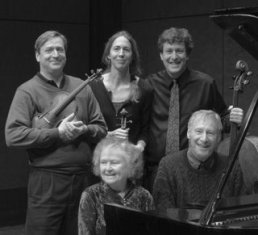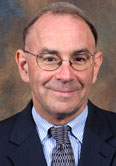
L to R front: Frances and Howard Karp, back: Dr. Christopher Karp, Katrin Talbot (wife of Parry Karp), Parry Karp
|
We all knew that, especially the stress part.
Listeners were given a rare opportunity to treat themselves with this age-old remedy and at the same time support the development of new ones Monday night at the University of Cincinnati College-Conservatory of Music’s Robert J. Werner Recital Hall.
The event was the
annual Chamber Music Benefit Concert supporting immunology research at Cincinnati Children’s Hospital Medical Center and the University of Cincinnati College of Medicine. Performing music by Beethoven, Szymanowski
and Chopin were cellist Parry Karp, violinist/pianist Christopher Karp, pianists
Howard and Frances Karp and clarinetist David Stern.

The hall was filled with music lovers of all kinds, many of them scientists and physicians, always among the most ardent musicophiles.
Two of the performers have successfully combined careers in medicine and music, Christopher Karp and David Stern. Karp is professor of pediatrics at the University of Cincinnati College of Medicine and chairman of the division of molecular immunology at Children’s Hospital Medical Center. Former concertmaster of the Wisconsin Chamber Orchestra, he has performed on chamber music series at the University of Wisconsin and CCM and also for CCM’s “Music X” Contemporary Music Festival held from 1996-2008. Stern, who made his Cincinnati solo debut in November with the Cincinnati Chamber Orchestra in Mozart’s Clarinet Concerto, is dean of the U.C. College of Medicine.
Christopher’s brother Parry and their parents Howard and Frances Karp have focused their careers exclusively on music. Parry is cellist of the Pro Arte String Quartet and artist-in-residence, professor and director of the string chamber music program at the University of Wisconsin. Howard is emeritus professor of music at the University of Wisconsin in Madison. Frances is also a well known pianist and teacher. Howard and Frances have performed widely as a duo and have made many recordings together.
Members of the Karp family performed on the first U.C./Children’s Hospital immunology research benefit concert, held at CCM in January, 2008.
Parry Karp has enriched the cello repertoire with transcriptions of many works written for other instruments. He opened the concert with the Sonata in D Minor for Violin and Piano by Karol Szymanowski (1904), transcribed for cello by Polish cellist/composer Kazimierz Wilkomirski and Karp. Richly melodic and inventive in the late romantic German style, it makes the transition to cello with considerable grace. Karp, performing with Frances Karp on piano, soared with it, often into the cello’s highest register.
Stern, who before becoming a physician was principal clarinetist of the American Symphony Orchestra led by Leopold Stokowski and performed solo recitals at Carnegie Hall under management by the Concert Artist’s Guild, joined the Karp brothers, with Christopher on piano, in Beethoven’s Trio in B-flat Major, Op. 11, for Clarinet, Cello and Piano. This utterly charming work, nicknamed the “Gasswenhauser” (“Street Song”) because the last movement is based on a popular aria of the time, was irresistible here: full of brio, but light-footed in the opening Allegro, heartfelt in the Adagio with its touchingly simple theme introduced by cellist Karp. The three musicians had fun imitating and interacting with each other in the playful finale.
Parry returned with Frances Karp to close the first half with Chopin’s Polonaise Brillante for cello and piano, an early work (Op. 3) as virtuosic for piano, if not more so, than for cello. Frances’ hands flew over the keys and Parry, who is gifted with a singing tone and an engaging, fluid technique, captured all its swagger and excitement.
Parry and Howard Karp opened the second half with another Szymanowski gem, the Romance for Violin and Piano, transcribed for cello by Parry. Written in 1910, this yearning, more impressionistic-leaning work is predominantly high-lying for the cello. Karp’s amazingly smooth legato underlined its dreamy atmosphere as he climbed into violin range at the end.
Final work on the program was again Beethoven, the Piano Trio in E-flat Major, Op. 70, No. 2 with Howard, Christopher, this time on violin, and Parry on cello. This was the climax of the evening and its best ensemble performance. Violinist Karp led with strength and spirit, Howard’s aristocratic pianism was a delight and all three players brought out the work’s exuberance and pre-Schubertian grace.
All proceeds of the concert will support immunology research and training through the Center for Immunological Research at Cincinnati Children's Hospital Medical Center and the University of Cincinnati College of Medicine.